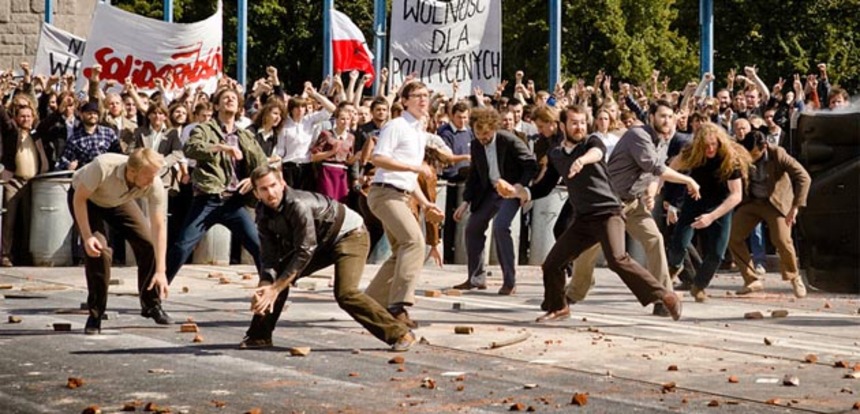MSPIFF 2013 Review: 80 MILLION Is A Cerebral Cat-And-Mouse

80 Million, Poland's 2012 candidate for Best Foreign Language Film, teases of a bank heist but delivers a cerebral, dialogue driven cat-and-mouse. The dramatic retelling of the anti-communist groundswell in 1980s Poland delves head first into the politically and socially tumultuous era to the point where it may leave some international audiences behind. Waldemar Krzystek, for better or worse, doesn't pander to international audience with watered-down or simplified maneuverings and instead keeps the story, based on true events, firmly entrenched in complex political manipulations of the moment, some of it lost on those of us less familiar with the where, when, and how.
The "where" is Wroclaw Poland and the "when" is 1981, one year after the establishment of Solidarity, the trouble-making trade union committed to rattling if not overthrowing the oppressive, Russian imposed, ruling government. As the union's power and public popularity grows, the government and various arms of the Russian and Polish secret police are feeling the squeeze and embarrassment of the social sea change. In attempt to regain control both ideologically and financial, the government instates a period of martial law banning pro-democracy organizations, imposing a curfew, closing boarders, and, most important to the story at hand, freezing financial assets.
And this is where the "how" of 80 Million comes in, and specifically how Solidarity carries out plans to liquidate their bank account--with a balance of, you guessed it, 80 million Polish zlotys--under the watchful eye of the paranoid secret police. Well aware that their movements were being closely watched and that the government would like nothing more than to appropriate their funds, a handful of activists plans an elaborate scheme to ditch the shadowing spies and safely harbor their cash in trusted hands of their allies with the clandestine support of the bank and the Catholic church.
To 80 Million's credit, it engages on diverse levels of the genre spectrum without missing a beat between comedy, thrills and drama. Unfortunately, that mash-up doesn't bode well for the credibility for this large cast of characters who end up resembling ill-defined chess pieces in a fast moving game. This could not be better demonstrated than a pair of cartoonish secret service agents--one wearing an Inspector Clouseau moustache and the other oversized glasses fashionable for women at the time--who play the roles of Keystone Kops one minute and then waterboarding thugs the next. Our heroes are equally facile, donning a predetermined earnestness and virtue that feels understandably nostalgic but regrettably cliché.
Banality and tonal incongruities aside, Krzystek captures the period with stylistic appeal. Shot with a color palette leaning towards grey with communist era blues and greens highlighting, the film rallies a minimalist car chase through the snowy streets centering on the search for a green Fiat being driven by the Solidarity suspects--the joke being that police are driving a yellow Fiat and just about every other car is a green Fiat. Krzystek was a young adult at the time of these incidents and his attention to detail will be signposts for his generation.
The full dramatic blow-out offers an optimistic release to the tumult of good versus evil. Justice is served to the villainous police officer, his sickening sneer cathartically wiped from his face by the clever negotiations of a Catholic priest. And a public protest shows the pro-democracy crowd pushing back the helmet-wearing and baton-wielding police as a sort of victory cheer for the film. Truth be told, that moment at the end of 1981 was the beginning of a decade long struggle where the worst was yet to come in the form of arrests, torture, and persecution before Solidarity candidate Lech Walesa won the presidency in 1990. And the epilogue, denoting what happened to the characters depicted in the film after '81, eludes to this, but only as a minor punctuation point. As much as 80 Million is homage to this story and the bravery of the freedom fighters, it's clear that history is merely a springboard for whipped up sentiment in the form of entertainment.







